| Reviews & Columns |
|
Reviews DVD TV on DVD Blu-ray 4K UHD International DVDs In Theaters Reviews by Studio Video Games Features Collector Series DVDs Easter Egg Database Interviews DVD Talk Radio Feature Articles Columns Anime Talk DVD Savant Horror DVDs The M.O.D. Squad Art House HD Talk Silent DVD
|
DVD Talk Forum |
|
|
| Resources |
|
DVD Price Search Customer Service #'s RCE Info Links |
|
Columns
|
|
|
2 or 3 Things I Know About Her - Criterion Collection
THE MOVIE:
"Language is the house man lives in."
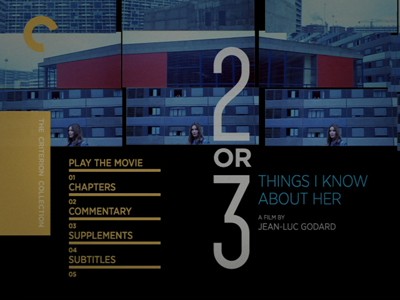
This is the second time I've seen Jean-Luc Godard's 1967 film 2 or 3 Things I Know About Her, and I still am not entirely sure what to do with it. It's a complicated movie, obtusely structured, full of ideas and jarring storytelling conceits, but also aesthetically pleasing, glowing with bright colors and full of beautiful girls. At the end of the film Godard shot alongside this one, the (by comparison) more conventional Made in U.S.A., he made a declaration with a double meaning, "Left, Year Zero." Being as Anna Karina and Philippe Labro were discussing politics, it leads one to believe that it's a call to the radical thinkers to get back to basics, but since they are also in a car, it's a direction, turn left to get back to square one.
That declaration is also tied to the belief that language is dead, we need to redefine how we classify and communicate. These were ideas that were very much on Godard's mind as he headed for the death of cinema that was his kiss-off to the 1960s, Weekend. He was looking for a way to put cinema back at its reset point, to understand further how language transcends image, how both can push ideas across. In 2 or 3 Things, comic strips are mentioned as a prime example of the disparity between what is written and what is seen, between explanation and perception, form and function.
Though this twitchy film rarely sits still for long, we could break it down to two narrative lines. In one, Godard shows us construction and the changing Parisian landscape, as he speaks to us in hushed voiceover about progress, capitalism, and the way modern man being pushed to constantly go forward becomes a means for holding him back. In the other, he follows Juliette Janson (Marina Vlady) through her day, from doting mother and wife to prostitute and back home again. This idea came from a newspaper article Godard had read that detailed how life in newfangled high-rise projects demanded more money than most families could afford, and so women were turning tricks to make ends meet. Intrigued by this idea, how having a less personal space ended up costing people more money and encouraged drastic solutions, Godard made it the subject of this picture.
Juliette--or, as it were, Marina, since our introductions to the actress and the character are presented back to back, with little change to the description--is not the only working girl Godard's camera settles on. He and his regular cinematographer, Raoul Coutard, shoot 2 or 3 Things like a documentary, and each woman they meet speaks directly to the camera and the unseen maestro conducting her interview. In reality, Godard was speaking to these actresses through an ear piece, so that they could hear his questions and respond, or even parrot the lines he fed them. This is why they are often looking at the camera expectantly, not entirely in the moment. They are actually more present than most actresses, the façade having been wiped away, waiting for their prompt.
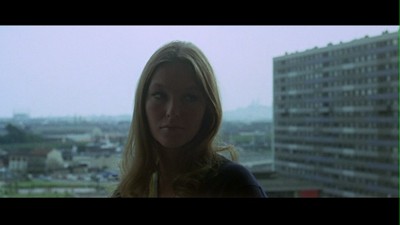
Though many of the elements Godard displays--construction, mechanics, commercials, fashion magazines, shopping, beauty parlors, Vietnam--seem disparate, in his theorizing, they are all combined. Progress demands consumption, consumption in turn has certain economic demands, and these economic demands lead to more oppressive politics, a way for the governing powers to further control the populace. In an early exchange, when Juliette's husband (Roger Montsoret) is listening to Lyndon Johnson talk about attacking North Vietnam, Juliette reads to him from a fashion magazine, wondering what stockings to buy. He can't believe she is concerned with such trivial things, she insists he has no culture. Godard wants us to see that it's in the interest of the powers that be to keep Juliette concerned about such superficialities, it keeps us from acknowledging the horrors that are occurring all around us.
Typing it out, I realize that this sounds vaguely like a crazy conspiracy theory, and there is something almost conspiratorial about this film. By whispering his narration, it's like Godard is inviting us into a huddle where he is sharing these volatile secrets. It also fits the faux documentary aesthetic, sometimes coming off like he doesn't want to disturb the characters onscreen or alert them to his presence. Some Godard theorists also think it's because he's grown less detached and more personal, that this is him confessing and telling his audience how he really feels. In Made in U.S.A., the taped confession was of a character and based on real-life political testimonies; in this case, it's all JLG.
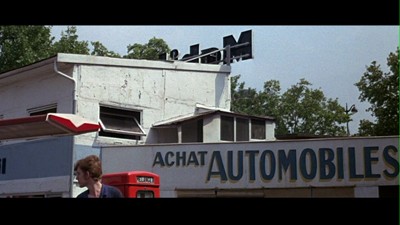
There is an interesting line of inquiry to be followed in this film in terms of the sexual politics. It would actually be easy to paint Godard as a sexist himself. In Made in U.S.A., his last film with ex-wife Anna Karina, one interpretation sees him as portraying her as killing off his innocence. At the time of this film, Godard was nursing a broken heart and bruised ego after his new star, Marina Vlady, rejected his marriage proposal. Hence, it could be dirty editing room trickery to say she and her role are one and the same, to suggest all actresses are whores. This would mean the scene between husband and wife where Vietnam is considered less relevant by the woman than her leggings is Godard belittling women intellectually (and, indeed, the bespectacled Robert character, the mechanic who builds things while also clinging to his ideas and ideals, often looks like the director). I think this would be a false assumption, however, that it misses Godard's larger argument about capitalism vs. communism, and that all work is prostitution in its way. Robert doesn't own his own garage, after all, he toils for someone else the way a film director may toil for a producer or a studio.
If we're to accept a more positive view of the women in 2 or 3 Things, then it's a sympathetic ear Godard lends when he lets them tell their stories. He is also exposing the institutional crime that not only condones their subjugation, but perpetuates it; he prefaces many of their tales by pointing out how they are really just the same old stories we've heard before. Again, it comes down to our use of language and to communication. Near the end of the movie, he depicts two conversations in a café. One is between Robert and an unknown girl (Juliet Berto), and though it starts innocently enough, the man soon turns the topic to sex. Across the way, a student (Blandine Jeanson) talks to what is supposed to be a Nobel Prize-winning author (Jean-Pierre Laverne), but what begins as an exchange of theory turns into another chat about the banal. No one knows how to talk with one another anymore, especially not in the movies (or so says Robert).
This adds more meaning to when Juliette and the other working girls talk to the camera about the ideas in their heads, about their descartesian philosophical conundrums. Then again, if they think and therefore are, Godard gives us another troubling irony here. These girls aren't sharing their innermost thoughts, they are sharing what the writer/director tells them to share. Are we back to him saying women have no mind of their own? Let's not forget, he's also letting us ogle them, admiring their beauty with and without clothes, all for the price of a ticket (or, as it were, a DVD). Again, I don't think so, but one would hope it's not a contradiction lost on the director. The Bertold Brecht quote Juliette recites at the outset is another piece of evidence working in Godard's favor.
Godard's awareness is important becaue, ultimately, one of the main conclusions that the movie comes to, and one uttered by Juliette/Marina, is that what we see and experience and how we describe it not only effects us, but the world around us. And vice versa. When we build these cheaply made but overly priced commercial spaces that have no individual personality beyond the advertising that pushes us toward further consumption, it's no wonder we end up in an endless cycle of drudgery, unable to express ourselves, disinterested and shallow. In the final image of the film, Godard places an idyllic drawing of a loving couple in the middle of an arrangement of commercial products, a diorama of our materialistic lives. There we are, lost amongst the laundry detergent. These things take us back to zero, he moans, and we have to start over from there. Hit the button and go back to the start, or you'll end up so clean, scrubbed so sparkling white, you just might disappear.
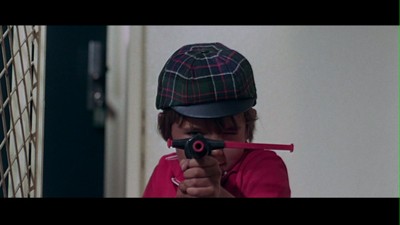
"If by chance you can't afford LSD, then buy a color TV."
THE DVD
Video:
The 2.35:1 anamorphic transfer on the 2 or 3 Things I Know About Her - Criterion Collection DVD is lovingly rendered, with vibrant colors and a pleasing grain that represents the original film stock. At times, I did notice a little haziness in terms of resolution, but this was rare. Overall, the picture looks splendid, with no dirt, scratches, or aliasing.
Sound:
The mono mix of the French audio preserves the original quality of Godard's audio mix, and it sounds very good. There is no hiss, no crackles or pops, and the tones and volume levels are all nicely balanced. This one has a lot of intentional clatter, and that comes through distinctly. It's meant to be loud!
The optional English subtitles are also very good.
Extras:
The 2 or 3 Things I Know About Her - Criterion Collection DVD comes in a clear plastic case with a double-sided cover. The interior booklet has photos, a chapter listing, cast and crew credits, an essay by writer Amy Taubin, and the original letter written by a French mother with a career that was also moonlighting as a prostitute that first caught Godard's attention.
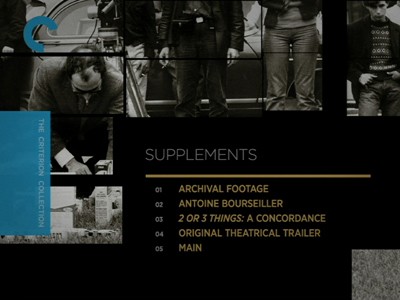
Adrian Martin, co-editor of Movie Mutations, has recorded an amazingly detailed commentary track for the movie. Shot by shot, he digs into Godard's influences and choices and digs toward the heart of what 2 or 3 Things means. I watched this after I wrote my review--as I always do with extras--and it helped clarify some of what I was already thinking, as well as lead me in new directions. Essential listening. To go with this, there is the featurette 2 or 3 Things: A Concordance" (9:49), a video essay detailing all of the pop culture and political references made in the movie. These have become a Criterion staple for their Godard releases and always add to one's comprehension and appreciation of the subject.
Theater director/writer/producter Antoine Bourseille sits down for a new 15-minute interview to discuss his relationship with Godard, which began when Bourseille put on a play staring Anna Karina and included cameos in Godard's films. His children were the children of Juliette and Robert in 2 or 3 Things. The friendship was more personal than it was professional, and eventually they had a falling out when Godard became stridently Maoist a year or so after this movie. It appears Godard made the same break in his social life as he did in his artistic one.
An "archival footage" section fetures two 1966 interviews from French television. One is with actress Marina Vlady (7 minutes, 33 seconds), the other is with Godard (13:11) and features him debating Jean St. Geours, a representative of the French government from the Ministry of Finance. Their springboard is the prostitution issue at the heart of 2 or 3 Things, and it's amazing to think that at one time a debate on television actually allowed for a real discussion. The Vlady piece also contains footage from the set of the film that shows Godard at work, and the actress talks about the unique approach he takes to filmmaking. She reveals her work on this film was completed in three weeks.
Lastly, there is the original theatrical trailer, always an essential bonus for a Godard film. Like Made in U.S.A.'s trailer, this one is silent, further solidifying the connection between the two.
FINAL THOUGHTS:
Highly Recommended. 2 or 3 Things I Know About Her sees Jean-Luc Godard making his transition from what was, for him, narrative-based films and heading into his agitprop essay-style. Here the two approaches collide in fascinating ways, exploring the urban growth in Paris and how young women were turning to prostitution to make ends meet. Combining scripted interviews with a documentary style, fact and fiction smash together in a bright, colorful, heady stew. Coming with the usual excellent Criterion extras and a knock-out transfer, it's another win for Godard fans.
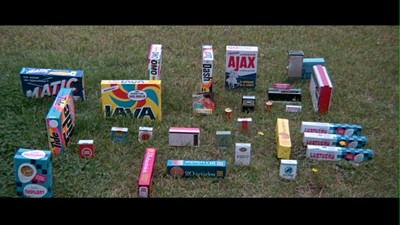
Jamie S. Rich is a novelist and comic book writer. He is best known for his collaborations with Joelle Jones, including the hardboiled crime comic book You Have Killed Me, the challenging romance 12 Reasons Why I Love Her, and the 2007 prose novel Have You Seen the Horizon Lately?, for which Jones did the cover. All three were published by Oni Press. His most recent projects include the futuristic romance A Boy and a Girl with Natalie Nourigat; Archer Coe and the Thousand Natural Shocks, a loopy crime tale drawn by Dan Christensen; and the horror miniseries Madame Frankenstein, a collaboration with Megan Levens. Follow Rich's blog at Confessions123.com.
|
| Popular Reviews |
| Sponsored Links |
|
|
| Sponsored Links |
|
|
| Release List | Reviews | Shop | Newsletter | Forum | DVD Giveaways | Blu-Ray | Advertise |
|
Copyright 2024 DVDTalk.com All Rights Reserved. Legal Info, Privacy Policy, Terms of Use,
Manage Preferences,
Your Privacy Choices | |||||||











